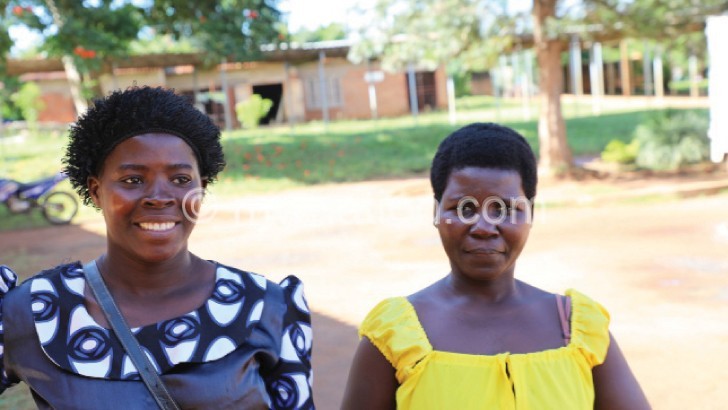Long search for fistula treatment
One morning in 2014, Margret Rambiki’s started her routine day by drawing water for household chores before going to farm in her crop field.
It is a common practice for women in Salamba Village, Traditional Authority (T/A) Mabuka in Mulanje, to greet each other and chatter as they wait for their turn at a borehole.
Chatter takes long for friends and smiles can be infectious.
Likewise, this day, Margret’s mother engaged her friend in a conversation on the health status of her family and children. As the chat continued, her friend mentioned something that caught her attention. She narrated how a certain woman who had been leaking urine for years was repaired at Chinyama Health Centre in Mulanje.

Instantly, she remembered how her daughter, Margret, was suffering from a similar condition. With rising interest, she got all the details on how she could access the service.
This was the beginning of the end of the long, winding road Margret had travelled since 2002 due to a birth-related injury known as obstetric fistula.
She will never be the same rejected woman who smells urine everywhere she went.
Know fistula
An obstetric fistula is a childbearing injury caused by obstructed labour. With prolonged labour and sustained pressure of the baby’s head on the mother’s pelvic bone, most of the soft tissues are damaged, creating a hole—or fistula—between the vagina and the bladder and/or rectum.
The hole leaves affected women leaking urine and faeces into the vagina. Those with this condition usually suffer stigma and isolation.
It is estimated that one percent of women aged 15 to 49 in Malawi have experienced an obstetric fistula.
Aged 14, Margret was impregnated by her husband, Robert Rambiki. Due to delayed access to healthcare services, she did not only lose the child but also developed an obstetric fistula.
She remembers that her father argued with the healthcare provider over the delayed care.
For 13 years, she endured stigma, ridicule and isolation from her friends.
Nonetheless, her husband, Robert stayed with her throughout.
In this condition, she gave birth to two children, a 13-year-old girl and a nine-year-old boy. The girl is in Standard Four while the boy is in Standard Two.
“I have never enjoyed being a woman since I had this condition. It was tough to live,” said the 30-year-old Margret.
Search for treatment
For 13 years, Margret and her husband tried many things to cure the condition. They have been to traditional healers and nothing helped them either.
“Herbalists have tried everything and we have been told to do lots of unimaginable things, but the condition was never healed. When you are in that situation, you try almost everything,” she explains.
When Magret’s mother told her to visit Chinyama Health Centre, she did not hesitate to go.
In early 2015, she arrived at the health centre. She was examined and informed that there might be specialised treatment arrangement at Mulanje District Hospital where many women like her would be attended to.
In November 2015, the first ever obstetric fistula repair camp was conducted at Mulanje District Hospital where Margret was repaired and is now healed.
“That morning my mom went to draw water saved my life,” she recalls. “I am now dry. I have no problem. This is how a woman should be.”
After the successful repair, Margret mobilises women in her community who have the same condition to get treatment.
She has helped two of her friends get repaired at the same facility.
During the 2018 obstetric fistula repair camp at Mulanje Hospital, with support from the United Nations Population Fund, (UNFPA), she brought her 33-year-old friend, Agnes Belubelu, to access treatment.
“There is a woman in my village. I still want to bring and access the service. I will ensure she comes in the next camp session” she says.
Belubelu has suffered from this condition since 2008. She is looking forward to being repaired and “going home dry”.
“At present, I am not thinking of having another child, I am afraid the condition may recur. I’m using family planning to ensure I will not get pregnant,” she says.
Fistula repair camps
In 2015, UNFPA supported the first ever fistula camp in Mulanje which re[paired over 25 women.
Among those repaired was a woman who had lived with fistula for 66 years.
In 2018, UNFPA yet organised another obstetric fistula repair camp in Mulanje. During this camp, 66 women were mobilised, 28 of them were treated and the rest were referred for specialised treatment as well as scheduled for the next repaired session.
“This treatment outreach approach has significantly brought services closer to the underprivileged women who suffer in silence while seeking treatment. We have changed lives of many women since we came to Mulanje” says Grace Hiwa, UNFPA programme officer for Fistula in Malawi.
Women from the surrounding districts such as Thyolo, Phalombe, Blantyre, Chiradzulu and as far as Neno and Mangochi and from Mozambique come to access treatment.
Since 2011, UNFPA, in collaboration with the Freedom From Fistula Foundation and Amref Health Africa, has been supporting government to provide fistula treatment in different districts. n





